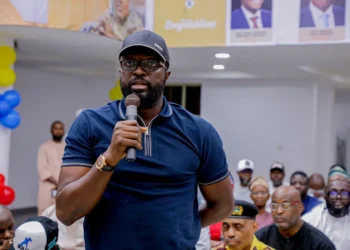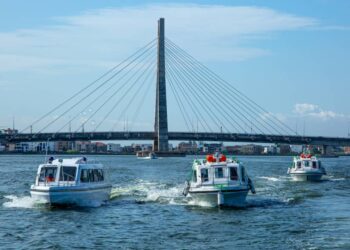The Lagos State Governor, Babajide Sanwo-Olu, has listed conditions that must be met, in order to bring a lasting solution to the dispute between petroleum tank farm owners at Ijegun-Egba area of Amuwo Odofin and the residents of the host community.
One of these conditions is that tank farm owners and petroleum tanker drivers must subscribe to operational regulations that limit the loading of tankers beyond their weight capacities. Also, all Federal Government’s regulatory agencies operating in the area must stop working at cross purposes with the state’s agencies, in the bid to address the environmental degradation in the area.
The governor also stressed that both the federal and state authorities should collaborate on the regeneration efforts of road and infrastructure in the area.
This disclosure was made by the Lagos State Governor on Thursday, August 13, 2020, in Marina, while receiving members of the House of Representatives Ad-Hoc Committee on the Relocation of Tank Farms. The Committee, which was constituted by the Speaker, Femi Gbajabiamila, was also intended to investigate and make recommendations on the issue.
READ MORE: Flour Mills aids Nigeria’s sugar self-sufficiency
The Hon Sergius Ogun led Ad-Hoc Committee had initially gone on a two-day inspection to Ijegun before sharing the findings with the Governor.
During the meeting, the governor pointed out that the regeneration of Ijegun-Egba was as important to the community as smooth transportation of petroleum products was important to the tank farms’ owners. He warned that the country could not afford to allow the host community’s agitation to hinder the operations of the tank farms, which, he said, supply 45% of petroleum products consumed in the country. The governor said:
“The Ijegun-Egba tank farms are strategic national assets created by the private sector to serve the whole country. Between 40 to 45% of the entire petroleum products that go across the country pass through that corridor. Even if it is to cater for our own need, we must take care of those assets, because they are like a strategic reserve for us as a nation.
“The rudiment of the problem in the area is a logistic issue, which is to ensure the movement of oil tankers in and out of the area without affecting the wellbeing of the community members. We have had to contend with environmental issues and the extent of the bad road network on the corridor is glaring. We have seen how small-capacity tankers are carrying up to 70,000 litres of petroleum products when they should be taking only 30,000 litres. This has exerted great pressure on the roads and the officers that are supposed to monitor them look away.
“These are part of the issues we need to resolve with the stakeholders. If we can let these people run their businesses within the confines of regulations, part of the solutions would have been achieved in the process. Also, there is a need for total regeneration of the roads in the area. We want the environment to be conducive for business, but we must do that in line with the safety of lives and property. We have talked with tank farms’ owners and we all need to come together. It is important for the Federal Government’s agencies to have an agreement and we are ready to play our own part.”
The committee was set up following the agitations and demands by residents of Ijegun Egba Satellite Town for the immediate relocation of the tank farms in the residential area. This, according to the residents, would help to prevent further environmental degradation and loss of lives and property in the area.
The host community accused tank farm owners of disrupting the drainage system, damaging roads within the community, and even converting roads to parking lots for their tankers.
The Governor stressed that genuine solution would be achieved if the entire network of infrastructure in the host community was cleaned up and regenerated. He, however, revealed that the new regeneration design that the state came up with could not take off because the federal authorities had not agreed with the plan.
Furthermore, Sanwo-Olu noted that it is high time for all the stakeholders to come together in order to provide a lasting solution to the issue.
READ ALSO: Flour Mills aids Nigeria’s sugar self-sufficiency
“After your thorough assessment of the situation, I hope you would be able to call all relevant stakeholders and agencies of Government together on the discussion table. We are committed to any effort that’ll bring a permanent solution. We know how much of investment we have in the area, but businesses have to be done under a safe and controlled environment. We want every stakeholder to play their roles,” he said.
Making his own remark, the Chairman of the Ad-Hoc Committee, Hon Ogun, admitted the inability of the Federal authorities to work collaboratively with the Lagos State Government was part of the reasons the community’s agitation festered. He, however, promised that the House would prevail on the federal agencies to close ranks with stakeholders and bring about lasting solutions.






















